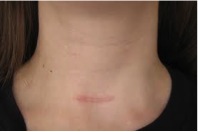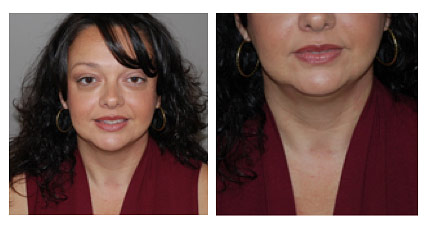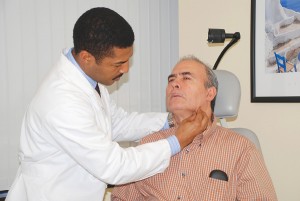- India Medical Mission 2018 - November 1, 2018
- Sleep Disorders: Sleep Apnea and Upper Stimulation Therapy - August 25, 2015
- The Naked Vocalist Podcast Featuring Dr. Reena Gupta - May 27, 2015
- New Therapy for Sleep Apnea – First Sleep Pacemaker placed in California at Osborne Head and Neck Institute. - December 12, 2014
- Boxer’s Ear: Can your ear explode? - December 12, 2014
- Nose Picking (Rhinotillexis) and Septal Perforations: Why I should stop picking my nose…? - November 24, 2014
- Deviated Septum and Septal Perforation - July 28, 2014
- Hereditary Hemorrhagic Telangiectasia: Nasal Septal Perforation Repair - June 25, 2014
- Dr. Mantle recognized at the Beverly Hills Medical Science Academy Awards - May 8, 2014
- Commonly Misdiagnosed Pathologies: Arteriovenous Malformations - April 9, 2014
 Dancing with the Stars alumna, Brooke Burke, recently announced her diagnosis of thyroid cancer. In a statement she posted on YouTube, she stated:
Dancing with the Stars alumna, Brooke Burke, recently announced her diagnosis of thyroid cancer. In a statement she posted on YouTube, she stated:
“I need to have thyroid surgery … which means I’m going to have a nice big scar right here across my neck… I don’t get to just walk around and pretend like nothing happened or not follow up or not share it, because it’s going to be pretty much dead center.”
She addresses the way her cancer was discovered, during a routine physical exam. She had no symptoms and was shocked to find, after numerous tests, that her small nodule was indeed cancerous. It is important that she considers the scar she will have. As a celebrity and entertainer, scarring in such a visible place is undoubtedly of concern to her. However, even for the average patient, this is a relevant issue and often, the most permanent reminder of the thyroid cancer diagnosis.
Is thyroid cancer common?
Thyroid cancer is relatively rare, accounting for only 1% of new cancer diagnoses in the United States. While radiation exposure increases the risk of developing thyroid cancer, the majority of thyroid cancer patients do not have this history. Other risk factors include:
- Female gender (women are 3x more likely to get thyroid cancer)
- Age (most common in women 40-50 years of age)
- Family history
Is thyroid cancer dangerous or deadly?
There are several different kinds of thyroid cancer, some of which are, indeed, life-threatening. Actually, if caught too late, all forms are potentially fatal.
The most common type, papillary thyroid cancer, is very treatable if caught early. The other types (follicular, medullary, and anaplastic) vary in seriousness; however all do better if caught early, before spreading outside the thyroid gland.
What is the treatment of thyroid cancer?
Treatment depends on the type and stage of cancer but almost always involves thyroidectomy (removal of part of all of the thyroid gland). Other components of treatment may be:
- Radiation
- Treatment of neck lymph nodes (may require removal if disease has spread)
Does thyroidectomy always involve a scar in the middle of the neck?
Unfortunately, the thyroid’s location in the middle of the neck almost always requires an incision in that area. Some surgeons have used an incision in the armpit with success but this is not commonly done.
More important than the incision location is the technique of closure. The better an incision is closed and cared for after surgery, the better it heals. Indeed, even an incision in the middle of the neck for thyroid surgery can be nearly invisible. However even poorly-healed scars can be treated.

This picture shows a patient treated at Osborne Head and Neck Institute’s Thyroid Surgery Center.

As with any surgery the most important factors in patient outcome involve choosing the right surgeon and surgical team. The most critical factors should be:
- Significant experience with the procedure
- Surgery performed by fellowship-trained surgeons not surgeons in training (residents)
- Careful close follow up after surgery
- Closure of the wound and wound after-care by a fellowship-trained facial plastic surgeon
To learn more about cosmetic surgery by thyroid surgery, and other procedures offered at the internationally renowned Osborne Head and Neck Institute visit our website at:
http://www.thyroidsurgerycenter.com/




